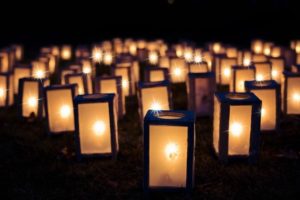As I write this, over 200,000 Americans have lost their lives in the Covid 19 pandemic. And worldwide, we’re approaching a million deaths. This leaves millions of people—children, parents, partners, friends, and family members—struggling with the unimaginable grief of having lost a loved one. Even worse is that many families are also dealing with the fact that the last time they saw their loved one was when they dropped them off at the emergency room or saw them loaded into an ambulance. No time to say goodbye, acknowledge what was happening, or to have those last quiet conversations.
And yet, for the most part nobody’s talking about the collective grief that’s blanketing our country, and countries around the world. However, we need to talk about the grief, about the incredible loss associated with this pandemic. We need to talk about the grief in order to acknowledge the loss, to show respect for those people who were a part of our lives who are now gone, and in order to begin to heal.
I’ve learned that grief can make people pretty uncomfortable. Many don’t want to mention it, or don’t quite know what to say. As a result, some  people don’t say anything when they should, or act like the overwhelming loss never happened. Sometimes well-meaning people don’t want to bring up a death of a loved one for fear that they remind the grieving person of their sadness. Trust me, a recent loss is always front and center in a grieving person’s mind—there’s no danger that they’ve forgotten it.
people don’t say anything when they should, or act like the overwhelming loss never happened. Sometimes well-meaning people don’t want to bring up a death of a loved one for fear that they remind the grieving person of their sadness. Trust me, a recent loss is always front and center in a grieving person’s mind—there’s no danger that they’ve forgotten it.
So, I’m going to talk about grief, because I know a little bit about it, and it’s still pretty fresh. Two years ago, I lost my 28 year old son to a rare and aggressive kind of cancer. I understand the devastation of losing a child; of losing someone that was as important to me as life itself. Knowing that I would lose my son, I soaked up every atom of him while he was alive. And I was able to have those last quiet conversations and be with him at the end. In light of this Covid pandemic, I now see that those last months, days, and hours were incredible gifts.
I learned that grief does funny stuff to your brain. It rations out only as much pain as you can take in the moment. Early on, there was a kind of numbness where I remember thinking, “This doesn’t feel so bad.” But of course, the Novocaine of numbness began to wear off, and the grief came rushing in as waves. Sometimes they were little wavelets lapping at my ankles, but more often the waves were overwhelming, giant breakers that came out of nowhere, triggered by a song, a word, a picture. Those big rollers tossed me around and spit me out exhausted and inconsolable. My point is that the intensity of grief changes minute to minute.
Grief makes you forgetful and distracted. Your brain is numb, and you’re trying to function on autopilot. At one point, I got lost driving home from the airport; a drive I’d made hundreds of times. Another time, a grief counselor told my husband and me to be careful out there, because in our  altered state of grief, we were dangerous.
altered state of grief, we were dangerous.
While grief is all about emotional pain, it also can have some very real physical manifestations. For several months after my son died, I felt as if I had been beaten up. I was exhausted, had vertigo, and for a while I smelled things that weren’t there. The physical fallout from grief causes inflammation and diminished immunity. It can be responsible for frequent colds and flu, digestive problems, insomnia, high blood pressure, and aches and pains.
I’ve have learned that I don’t corner the market on grief; everyone has grief and loss in their life at some point. This has become very clear in the days of Covid 19. I’ve also found that this kind of sadness doesn’t end, it just continues to change. I used to think of grief as something you eventually get over. But I now know that’s not the case. The grief will keep changing, like a child growing where once you get a handle on the Terrible Two’s, they turn three. I’ve been told that with time, the sadness recedes enough that the good memories begin to shine through. I look forward to that time, but for right now, I’m still standing in the surf.
If you know someone who has lost a loved one to Covid 19, please reach out to them. Acknowledge their loss and their pain, and let them know that you’re thinking about them.



